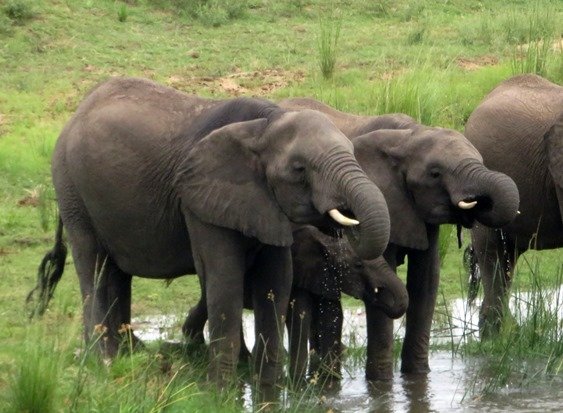Thirst

Author: Ivan Lätti
Photographer: Ivan Lätti
Drinking water is good for you! Elephants do it. They are at home in many habitats including semi-deserts but happy in savannah full of good food and much water. Eating for 18 hours per day, the average elephant daily consumes 150 kg of vegetable matter; a big bull’s intake may be 340 kg. This work brings thirst. An elephant drinks about 150 litres of water on an average day. This relates to 50 litres of urine excreted per day.
Some people habitually don’t drink enough water while others may binge on it. That is apart from many other drinks available to people, some more beneficial than others. Elephants, not acquainted with the fancy beverages of the world prefer clean water. Who wouldn’t?
An elephant may drink three times a day when water is available, staying without for days when it is not. Elephants herds find water along traditional routes established over generations; or dig holes where they smell underground moisture. The pharyngeal pouch in the elephant’s throat allows the animal to store water for sucking through the trunk and spraying over their bodies or those of calves.
Waterholes and rivers dry up periodically, depriving animals from drinking sufficiently, some even dying during drought. Water availability is unfortunately becoming a bigger problem for many on earth due to human population increase. Lessons are learnt from the Cape Town experience of 2017 and 2018 and similar situations.
Better water management alleviates such problems. But population numbers keep increasing and still better measures will be required until… But we don’t go there because the human mind freezes when the implications of that line of thinking become clear.
The quality of potable water is another matter requiring and receiving attention increasingly. Fortunately, good education and continued research support those efforts in some parts of the world. Where funds are available for the civil engineering, water science and technological solutions to be provided, people and animals benefit.
This does not happen everywhere but life seeks escapes from problems and thrives on hope. Elephants and much else depend on people for turning hope into action. The human mind, a great inventor and problem solver until today, will be tested more for finding solutions to ecological problems of the day, ensuring more days for more that live (Riëtte, 2016).

